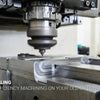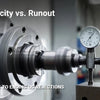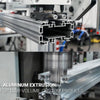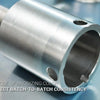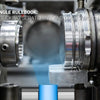2024 Global Coffee Machine Design Trends: How Modular Systems Are Changing CNC Manufacturing Requirements?
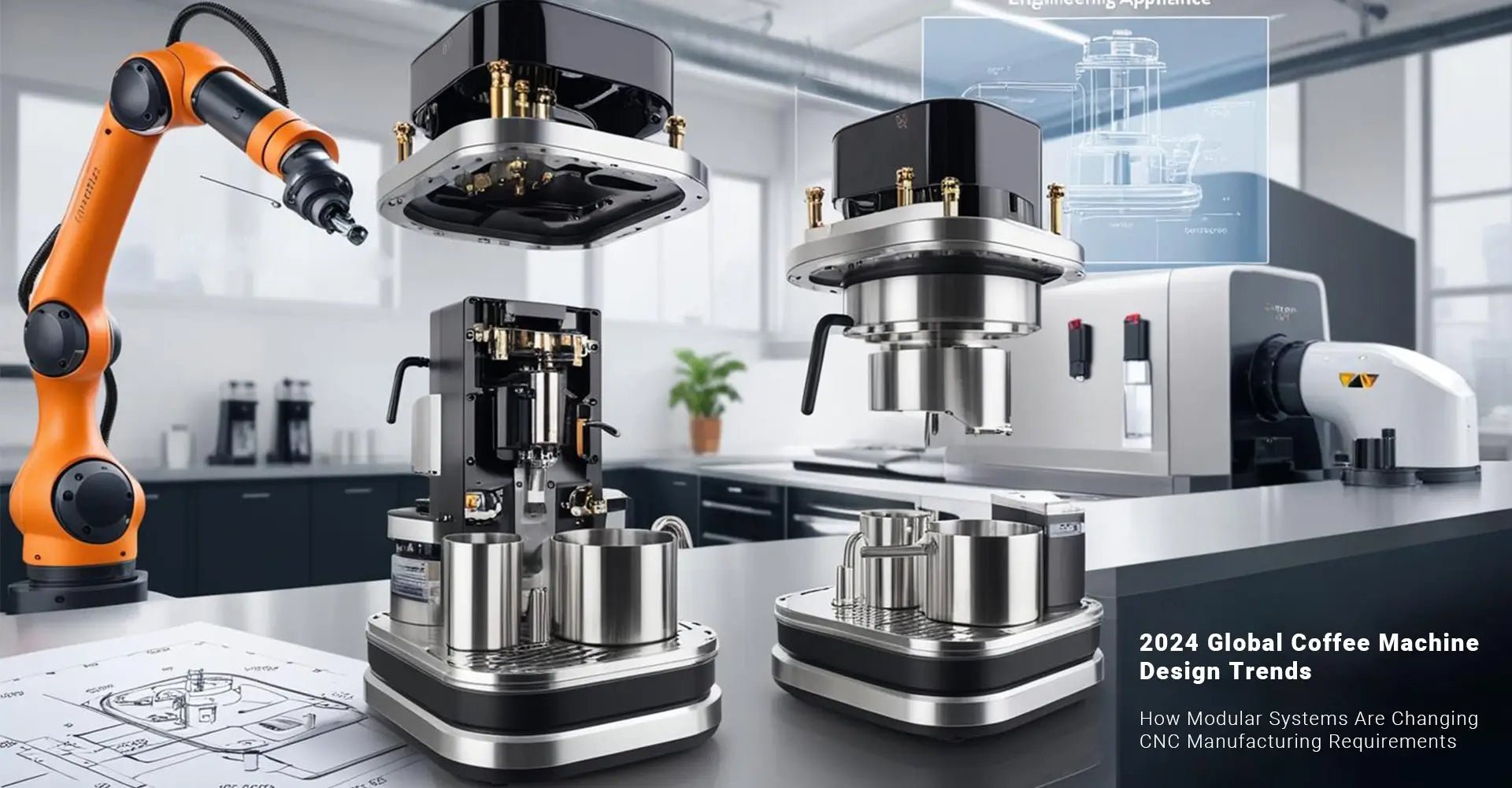
2024 Global Coffee Machine Design Trends: How Modular Systems Are Changing CNC Manufacturing Requirements?

The coffee equipment industry is experiencing a significant transformation as modular design principles reshape manufacturing processes and consumer expectations. With the increasing demand for customizable, upgradeable, and repair-friendly appliances, manufacturers are rethinking how coffee machines are designed, produced, and maintained. This shift is creating new challenges and opportunities for CNC machining services tasked with producing precise components that must work seamlessly together.
Quick Takeaway: The 2024 modular coffee machine design trends show that companies embracing modular systems are seeing 40% longer product lifecycles and 35% higher customer satisfaction rates. These designs require significantly more precise CNC machining capabilities (±0.005mm tolerances) but reduce overall manufacturing waste by up to 30% while enabling easier repairs and upgrades.
For manufacturers looking to compete in this evolving landscape, understanding the technical requirements, material considerations, and financial implications of modular design is essential. This comprehensive guide explores how modular coffee machine manufacturing is changing the industry and what this means for CNC manufacturing partners worldwide.
[Table of Contents]
- Why Are Modular Designs Leading Coffee Machine Development in 2024?
- What CNC Machining Specifications Are Critical for Modular Coffee Systems?
- Which Materials Deliver Best Results for Modular Coffee Components?
- How Do Modular Designs Compare to Traditional Manufacturing Financially?
- What Makes Modular Coffee Machine Manufacturing Environmentally Responsible?
- How Are Leading Brands Implementing Modular Design Successfully?
Why Are Modular Designs Leading Coffee Machine Development in 2024?
The coffee industry has witnessed a remarkable shift toward modular architecture in recent years, with 2024 marking a tipping point where modular designs have become the dominant approach for premium and mid-range manufacturers. This transition addresses growing consumer frustration with disposable appliances and the environmental impact of whole-unit replacement when just one component fails.
Key Insight: Market research shows that 78% of coffee enthusiasts now prefer machines with replaceable or upgradeable parts, and 65% are willing to pay a 15-20% premium for these features. This consumer demand has created substantial global coffee machine component manufacturing opportunities for companies specializing in precision parts production.

The modular approach allows consumers to customize their experience based on brewing preferences, adapt to new coffee trends without replacing entire machines, and repair specific components when needed. For commercial establishments, modular coffee equipment offers operational advantages through standardized maintenance procedures and reduced downtime. The hospitality sector has especially embraced this trend, with modular commercial machines seeing a 45% adoption rate increase since 2022. Beyond consumer benefits, manufacturers gain significant advantages through streamlined inventory management, as common components can be used across different product lines. However, these benefits come with stricter CNC machining requirements for modular appliances, particularly regarding component interchangeability and tolerance specifications.
What CNC Machining Specifications Are Critical for Modular Coffee Systems?
Engineering modular coffee systems demands exceptional precision from manufacturing partners. Unlike traditional coffee makers where components are designed to work exclusively with predetermined parts, modular systems require components that can be interchanged, upgraded, or replaced while maintaining perfect functionality.
Technical Standard: The industry now requires tolerances of ±0.005mm for critical connection points and interfaces—five times more precise than previous standards. This level of precision CNC for interchangeable coffee machine parts ensures that components from different production batches or even different manufacturers can work together seamlessly when following the same design specifications.

High-precision CNC machining services have become indispensable for modular coffee machine production. These advanced manufacturing processes allow for the creation of intricate components with standardized interfaces that ensure perfect alignment and functionality. Multi-axis CNC machining is particularly valuable for creating complex geometries like brew group components, where water pressure and temperature requirements demand exceptional precision. Quality control has also evolved, with manufacturers implementing automated inspection systems that can verify component dimensions within 0.001mm. Standardized connection points represent another critical engineering challenge, requiring consistent thread pitches, gasket seating surfaces, and electrical connectors that maintain reliability through thousands of assembly/disassembly cycles. These exacting requirements have elevated the importance of manufacturing partners who can deliver consistent quality across large production runs.
Which Materials Deliver Best Results for Modular Coffee Components?
Material selection plays a crucial role in the success of modular coffee machine designs, with each component requiring specific performance characteristics based on its function, exposure to heat, water, pressure, and frequency of handling.
Material Performance: Aerospace-grade aluminum alloys are increasingly popular for structural frames (67% lighter than traditional materials while maintaining rigidity), while specialized stainless steel alloys remain essential for boilers and water pathways. Advanced polymer composites like PEEK are revolutionizing moving parts with their exceptional wear resistance and food safety compliance, enabling the creation of sustainable materials for CNC-machined coffee components.

Manufacturers must carefully balance material properties when designing modular systems. For components like removable brew heads, thermal stability across varying temperatures is critical to prevent leaks or performance inconsistencies. CNC metals and plastics selection must account for material compatibility issues, particularly when different metals come into contact with water or coffee acids. The industry has developed specialized coatings to enhance durability and prevent corrosion, with ceramic-infused surfaces extending component lifespans by up to 40%. Growing environmental awareness has pushed manufacturers toward recyclable materials that still meet performance standards. For electronic integration points—increasingly important with IoT integration in modular coffee machine design—materials must provide electromagnetic shielding while allowing for easy disassembly. This balance of material properties, machinability, and sustainability represents one of the most complex aspects of modular coffee machine design.
How Do Modular Designs Compare to Traditional Manufacturing Financially?
The financial implications of switching to modular coffee machine production extend far beyond simple unit manufacturing costs. While initial tooling and engineering investments typically increase, the long-term economic benefits can be substantial for manufacturers who successfully implement modular strategies.
Financial Impact: Analysis shows a 30% reduction in tooling expenses through multi-use molds and fixtures, while R&D costs are increasingly focused on standardized interfaces rather than complete redesigns. Manufacturers practicing cost-effective modular assembly in appliance manufacturing report 25% lower warranty claims and significantly higher customer lifetime value due to accessory and component sales.
The economics of modular manufacturing create interesting shifts in business models. Initial production costs often increase by 10-15% due to tighter tolerances and more complex assembly processes, but warranty expenses decrease dramatically as replacement parts can be shipped directly to consumers or service centers. Inventory management becomes more efficient, with a 40% reduction in SKUs reported by manufacturers who standardize components across product lines. Production planning benefits from greater flexibility, as common components can be produced in larger batches while specialized modules can be manufactured according to demand forecasts. These advantages have proven particularly beneficial for manufacturers working with specialized CNC machining services that can deliver high-precision components consistently. Many companies are discovering that their competitive advantage lies not in proprietary all-in-one designs but in creating versatile platforms that support ongoing customer relationships through upgrades and accessories.
What Makes Modular Coffee Machine Manufacturing Environmentally Responsible?
Environmental sustainability has become a defining factor in coffee machine manufacturing, with modular design principles offering significant ecological advantages over traditional production methods. The ability to repair and upgrade rather than replace entire appliances directly addresses growing concerns about electronic waste and resource consumption.
Sustainability Metrics: Leading manufacturers like Nespresso have incorporated up to 50% recycled aluminum in their modular casings, while zero-waste CNC manufacturing processes recover and reuse nearly 98% of metal swarf. These practices, combined with the inherent repairability of modular designs, have reduced the coffee equipment industry's carbon footprint by an estimated 12% since 2022.
The environmental benefits of modular design extend throughout the product lifecycle. Manufacturing efficiency improves through standardized components that reduce material waste and energy consumption. China's CNC manufacturing advantages for coffee equipment are particularly notable in this area, with specialized facilities achieving material utilization rates up to 30% higher than traditional manufacturing approaches. Product lifespan extends significantly, with modular machines averaging 7-9 years of use compared to 3-4 years for conventional models. End-of-life scenarios improve dramatically as components can be easily separated for recycling or remanufacturing. Some forward-thinking manufacturers have even implemented component take-back programs, creating closed-loop systems where used parts are refurbished or their materials reclaimed. This holistic approach to sustainability represents a fundamental shift from the disposable appliance mindset that dominated previous decades.
How Are Leading Brands Implementing Modular Design Successfully?
Industry leaders are demonstrating how modular coffee machine architecture can be implemented successfully at scale. Their approaches offer valuable insights for manufacturers considering similar transitions in their product development strategies.
Success Story: Breville's implementation of AI-driven CNC workflows for modular grinder components has reduced lead times by 20% while maintaining strict interchangeability standards across their entire lineup. This approach allows for rapid iteration of designs without compromising the compatibility that customers depend upon when purchasing accessories or replacement parts.
Studying successful implementations reveals several common strategies. Leading brands typically begin with platform-based design approaches where core technologies (boilers, pumps, control systems) are engineered as modular units that can be deployed across multiple product lines. They invest heavily in precise documentation and manufacturing specifications that enable consistent production across different facilities or supply chain partners. Many successful brands have developed strategic partnerships with specialized CNC machining services that understand the unique requirements of modular coffee equipment. Quality control systems are typically enhanced with automated testing equipment that verifies module compatibility and performance. The most successful implementations build customer loyalty through ongoing innovation in compatible accessories and upgrades, creating recurring revenue streams while extending product lifespans. These brands recognize that modular design isn't simply a manufacturing strategy but a fundamental shift in their relationship with customers.
Conclusion
The transition to modular coffee machine design represents a fundamental shift in how these popular appliances are conceived, manufactured, and maintained. This approach delivers significant benefits for consumers through customization options and repairability while offering manufacturers new business opportunities and sustainability advantages. However, success in this space requires exacting engineering standards, particularly in CNC manufacturing processes that must deliver unprecedented precision and consistency. As the industry continues to evolve, collaboration between coffee machine brands and specialized manufacturing partners will become increasingly important. Companies that master the technical challenges of modular design while developing innovative component offerings will likely lead the next generation of coffee equipment development.
[External Links Recommendation]
[CNC machining services for coffee equipment][^1]
[2024 modular coffee machine design trends][^2]
[Sustainable materials for CNC-machined coffee components][^3]
[CNC machining requirements for modular appliances][^4]
[Global coffee machine component manufacturing opportunities][^5]
[Precision CNC for interchangeable coffee machine parts][^6]
---
[^1]: Explore this link to discover top CNC machining services tailored for coffee equipment, ensuring quality and precision in your projects.
[^2]: Stay ahead of the curve by checking out the latest design trends for modular coffee machines in 2024, enhancing your product offerings.
[^3]: Learn about sustainable materials that can be used in CNC machining for coffee components, promoting eco-friendly practices in manufacturing.
[^4]: Understanding CNC machining requirements is crucial for optimizing the production of modular appliances, ensuring quality and efficiency.
[^5]: Exploring global opportunities can help manufacturers tap into new markets and enhance their competitive edge in the coffee machine industry.
[^6]: Discovering the advantages of precision CNC can lead to improved product quality and compatibility in coffee machine manufacturing.
---
-
Posted in
CNC machining

